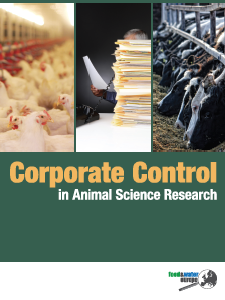 It isn’t hard to figure out why giant drug, seed and agrichemical conglomerates play such a big role in the science surrounding their controversial products and practices.
It isn’t hard to figure out why giant drug, seed and agrichemical conglomerates play such a big role in the science surrounding their controversial products and practices.
Industry-funded studies routinely produce results favourable to industry, far more so than independent work, and companies need these favourable studies to gain regulatory approval, win market confidence or, just as often, fend off claims that their products are unsafe. The results aren’t pretty. The tobacco industry used to claim that cigarettes were good for you. Right now a cancer link to Monsanto’s world-beating weedkiller glyphosate is unfolding after decades of “science”-backed use as a “safe” product.
Corporate Control in Animal Science Research, published today, documents how drug companies and corporate agribusinesses not only author and fund much of the research used to justify giving their drugs to food animals, they also serve as editors and sponsors of academic journals. It’s a real eye-opener.
In the case of the controversial beef-cattle growth hormone Zilmax, most of the available, peer-reviewed research was authored and/or funded by industry groups and published in journals with industry editors and sponsors. It was then widely used in the U.S. until serious animal safety issues emerged and the drug was voluntarily removed from market in 2013. It’s not the only example of its kind.
Science is supposed to be about answering questions honestly, but here we see clear conflicts of interest and bias in the scientific research we rely on, and it’s just the tip of the iceberg.
The talk of the town lately for politicians, regulators and scientists is “evidence-based policy”. This attempts to reassure us that important people doing important things have “high quality, independent and impartial scientific evidence” on their side. It’s a nice idea, if the waters weren’t so muddy.
For example, the European Food Safety Authority (EFSA), created in 2002 in the wake of high-profile food crises, says it is committed to providing “objective and independent science-based advice grounded in the most up-to-date and reliable scientific information and data available”. The European Commissioner responsible for Health and Consumers called EFSA a “trusted partner…an essential element in the equation that leads to the highest possible food safety standards for all in the EU”.
Yet EFSA does not do research. It collects data, analyses it and then issues an opinion upon which EU Member States then base their decisions. In the case of new GMOs, that data is provided by the company applicants, and those opinions come from EFSA’s GMO Panel, said to be made up of “21 independent scientific experts“. This independence is hard to credit given the revolving door between EFSA and the biotech and food industries. That door snapped the heels of former head (2003-2008) of EFSA’s GMO Unit (which supports the GMO Panel) when she walked through it into a lobbyist job for biotech giant Syngenta. She’s not the only example of her kind, either.
How confident are we about the safety assessments issued by EFSA under such leadership? Given what followed we might be forgiven for chuckling that the opinion on Syngenta’s GM maize GA21 during that time found it “unlikely to have any adverse effect”, but so do most GM import opinions, which is why EU farms are awash with GM feed despite a lack of evidence about its long-term effects.
Also during this time EFSA said that the post-market monitoring of GM crops, the mechanism supposed to catch any damage being caused that the “robust” approval process missed, supported the use of questionnaires issued to farmers, including for finding “unintended adverse health impacts”. We now know that in those questionnaires are issued by, and returned to, Monsanto, which then determines what information it will disclose and what it will keep to itself. It all feels a tad too cosy.
When some countries attempted to keep GM maize and oilseed rape (canola) – both prolific pollinators – out of their fields, EFSA’s opinion was that “there is no reason to believe that the [crops are] likely to cause any adverse effects”. At that time countries could not ban approved GM crops unless EFSA agreed they had uncovered new evidence (the rules have changed now), so EFSA effectively undermined those government attempts to regulate in the public interest. The GM train rolled on, and the head of EFSA’s GM Unit got a new job. Maybe it’s coincidence.
Evidence-based policy and decisions? Yes please. The sooner the better.


